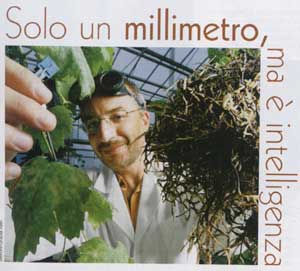
Controversial plant intelligence
 Michael Pollan has a new piece in the New Yorker
and, while it's long, I highly recommend every gardener read it.
Pollan reports on fascinating (and scientifically sound, although
controversial) studies that suggest the possibility of plant senses and
behaviors we didn't learn about in school. Some of the scientists
Pollan spoke to even use terms like "plant intelligence" and talk about
plants learning.
Michael Pollan has a new piece in the New Yorker
and, while it's long, I highly recommend every gardener read it.
Pollan reports on fascinating (and scientifically sound, although
controversial) studies that suggest the possibility of plant senses and
behaviors we didn't learn about in school. Some of the scientists
Pollan spoke to even use terms like "plant intelligence" and talk about
plants learning.
I was most interested in
possible plant senses outside the ordinary. For example, multiple
time-lapse videos show that bean plants grow directly toward a metal
trellis, seeming to know exactly where the support is located.
Pollan reported that the scientist "speculates that the plant could be
employing a form of echolocation. There is some evidence that plants
make low clicking sounds as their cells elongate; it’s possible that
they can sense the reflection of those sound waves bouncing off the
metal pole." In another study, the same scientist "found
that plant roots would seek out a buried pipe through which water was
flowing even if the exterior of the pipe was dry, which suggested that
plants somehow 'hear' the sound of flowing water."
I'd heard rumblings about
this next study, but found Pollen's interpretation fascinating there as
well. He wrote about how a scientist used radioactive carbon
isotopes in a forest to show how trees exchange nutrients using
mycorrhizal fungi. In the study, "mother trees" specifically
nourished their offspring, and were seemingly able to recognize that
familial relationship. In addition, evergreen and deciduous trees
of different species shared food at different times of the year --- "the
evergreen species will tide over the deciduous one when it has sugars
to spare, and then call in the debt later in the season."
Finally, a very
controversial study suggests that plants may be just as conscious as
certain animals. One study showed that "plants can be rendered
unconscious by the same anesthetics that put animals out." Pollan
continued, "What’s more, when plants are injured or stressed, they
produce a chemical—ethylene—that works as an anesthetic on animals. When
I learned this startling fact from Baluška in Vancouver, I asked him,
gingerly, if he meant to suggest that plants could feel pain.... 'If
plants are conscious, then, yes, they should feel pain,' [Baluška] said.
'If you don’t feel pain, you ignore danger and you don’t survive. Pain
is adaptive.' I must have shown some alarm. 'That’s a scary idea,' he
acknowledged with a shrug. 'We live in a world where we must eat other
organisms.'"
Interesting reading if
you're willing to imagine plants as different from the passive organisms
most of us consider them to be. Or check out the embedded videos
to hear directly from a couple of the scientists in question.
Want more in-depth information? Browse through our books.
Or explore more posts by date or by subject.
About us: Anna Hess and Mark Hamilton spent over a decade living self-sufficiently in the mountains of Virginia before moving north to start over from scratch in the foothills of Ohio. They've experimented with permaculture, no-till gardening, trailersteading, home-based microbusinesses and much more, writing about their adventures in both blogs and books.
Want to be notified when new comments are posted on this page? Click on the RSS button after you add a comment to subscribe to the comment feed, or simply check the box beside "email replies to me" while writing your comment.

Every time I hear about one of these studies (I debated putting quote marks around that word), I think of the Roald Dahl short story "The Sound Machine".
http://www.roalddahlfans.com/shortstories/soun.php (the link is to a description of the story)